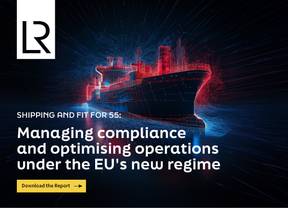FerryBox: PONANT Exploration Vessel Collecting Arctic Ocean Data
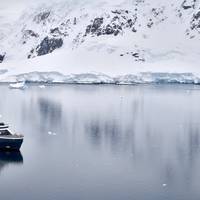
PONANT’s new science-focused exploration vessel has started collecting Arctic Ocean data with -4H-JENA engineering’s FerryBox multi-parameter water measurement system on board.The system is now being used to evaluate the role of global warming and glacial meltwater on the rising level of oxygen in the oceans aboard PONANT’s Le Commandant Charcot, the world’s only luxury icebreaker, a hybrid-electric vessel powered by liquified natural gas.A unique concept with minimal environmental impact due to her green energy and propulsion systems…
Glosten Tapped to Design Scripps' New Hydrogen-hybrid Research Vessel
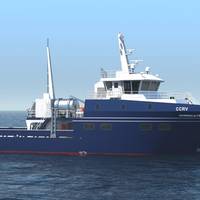
UC San Diego’s Scripps Institution of Oceanography today announced that naval architecture and marine engineering company Glosten has been selected as the naval architect for the university’s new California coastal research vessel. The new vessel will feature a first-of-its-kind hydrogen-hybrid propulsion system.Selected after participating in the university's request for proposal process, Glosten will provide the preliminary design, contract design and detailed design for the research vessel to be operated by Scripps Oceanography.“This vessel will be the first of its kind…
Healthy Planet Needs ‘Ocean Action’ from Asian and Pacific Countries

As the Second Global Ocean Conference opens today in Lisbon, governments in Asia and the Pacific must seize the opportunity to enhance cooperation and solidarity to address a host of challenges that endanger what is a lifeline for millions of people in the region.If done right ocean action will also be climate action but this will require working in concert on a few fronts.First, we must invest in and support science and technology to produce key solutions. Strengthening science…
Academia’s Climate Change Challenge is Far from Academic
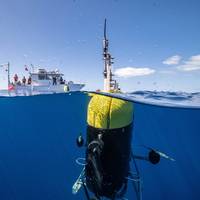
Highlighted in Marine Technology Reporter's MTR100 is the work and technology ongoing in the halls of academia. The most recent report released by the UN Intergovernmental Panel on Climate Change emphasized our warming planet, an expected announcement for many in the scientific community. Faced with the confirmation that human activities have caused an increase in global temperatures, research has turned to seeking answers in the planet’s natural systems. How does each part of the global carbon cycle work and how may it be impacted by the changing climate?
Ship Repair: Inside the $60m Refit of RV Roger Revelle
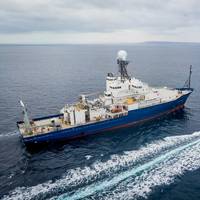
This month MR dives inside the $60 million refit of RV Roger Revelle, a project which leverages a treasure trove of ‘lessons learned’ from recent refits in the academic research vessel fleet and highlights the value of slimming the vendor list.Research vessel (R/V) Roger Revelle is back at work after a midlife refit involving upgrades from top to bottom, bow to stern. The ship is owned by the Office of Naval Research and has been operated by Scripps Institution of Oceanography at the University of California San Diego since 1996. It is one of the largest ships in the U.S.
Elakha: The Repowering of OSU's Valued Research Vessel
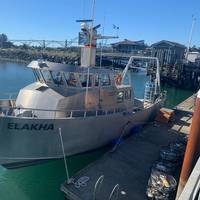
Ocean science is in high demand by scientists studying ocean acidification, wave energy, seabed composition, changing water temperatures, fish populations and dozens of other research projects. The Oregon State University (OSU) has a proud history in the field. The wide variety of research project require a variety of vessels.One boat that has made large contributions to research is the 54 by 16.5-foot Elakha which was built in 2001 at Rozema Boat Works of Mount Vernon Washington.
Elakha: Repowering a Valued Research Vessel
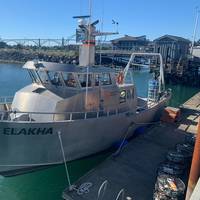
Ocean science is in high demand by scientists studying ocean acidification, wave energy, seabed composition, changing water temperatures, fish populations and dozens of other research projects. The Oregon State University (OSU) has a proud history in the field. The wide variety of research project require a variety of vessels.One boat that has made large contributions to research is the 54- by 16.5-foot Elakha which was built in 2001 at Rozema Boat Works of Mount Vernon, Wash.
China's Polar Icebreaker Embarks on First Arctic Mission
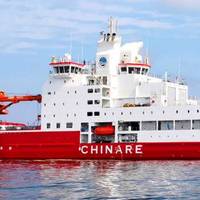
China's first domestically built polar icebreaker Xue Long 2 has set sail on its first mission to the Arctic, China's state-run Xinhua News Agency reports.Xuez Long 2 (Snow Dragon 2) departed Shanghai Wednesday with a team of Chinese scientists on board to conduct investigations in areas including the Chukchi Rise, Canada Basin and the central Arctic Ocean, Xinhua reports. The voyage is expected to cover some 12,000 nautical miles and conclude in late September.The expedition is said to be organized by China's Ministry of Natural Resources to study biodiversity and ecosystems…
Preparing for IMO 2020: Marine Emission Solutions
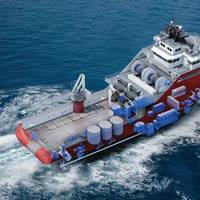
Part I: Enhancing Engines & Fuels"Wood Mackenzie forecasts a 25 percent increase in price for lower sulfur content fuel based on a SOx scrubber adoption rate of about two percent, but some scenarios could cause LSFO prices to spike by as much as 60 percent."Around 80 percent of global trade is carried by sea. With more than 125,000 commercial and naval vessels operating around the world, ship-engine emissions are projected to rise by 250 percent by 2050 unless controls are imposed.
Construction Starts on OSU's Research Ship
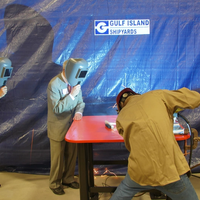
Construction of a new Oregon State University (OSU) bound research ship that will advance the science of coastal environments, and support research on topics such as ocean acidification, hypoxia, and sea level rise, officially began today at Gulf Island Shipyards in Louisiana.Officials from OSU the National Science Foundation (NSF) and Gulf Island Shipyards LLC gathered at the shipyard in Houma, La. for the keel-laying ceremony, marking the start of fabrication of the state-of-the art ship.
UN Push for Universal Agreement to Reverse Ocean Deterioration
The 193 Member States of the United Nations unanimously agreed to a set of measures that will begin the reversal of the decline of the ocean’s health as the five-day Ocean Conference concluded this afternoon. The outcome document, together with more than 1,300 commitments to action, marks a breakthrough in the global approach to the management and conservation of the ocean. The Ocean Conference, the first UN conference of its kind on the issue has raised global consciousness of ocean problems ranging from marine pollution to illegal and over fishing, from ocean acidification to lack of high seas governance. By including all stakeholders in the discussions, the Conference produced a comprehensive and actionable range of solutions.
Bleak Outlook for World's Oceans
Global warming will disrupt four-fifths of the world's oceans by 2050 if greenhouse gas emissions keep rising, Reuter's quoted scientists as saying. The situation is threatening fish that are the main source of food for a billion people. Curbs on man-made emissions, however, would give marine life more time to adapt to warming conditions or for marine life from algae to cod to shift to cooler waters nearer the poles, they said. "By 2050 around four-fifths of the ocean surface will be affected by ocean acidification and ocean warming," lead author Stephanie Henson, of the British National Oceanography Centre in Southampton, told Reuters of the findings. Carbon dioxide, the main greenhouse gas, forms a weak acid in water.
Antarctica’s Ross Sea Gets Protection
The Commission on the Conservation of Antarctic Marine Living Resources (CCAMLR) today agreed to set aside more than 1 million square kilometres of the Ross Sea in recognition of its incredible scientific and biodiversity values. CCAMLR committed to creating a system of marine protected areas in the Southern Ocean in 2009 and has been discussing the creation of MPAs in the Ross Sea and East Antarctica for several years. Claire Christian, director of the Antarctic and Southern Ocean Coalition, said “ASOC is thrilled to see that CCAMLR has protected 1.55 million square km of the Ross Sea, 1.12 million square kilometers of which will be fully protected with the remaining area designated as special research zones.
Tropical Coral reefs lose their Zooplankton through Ocean Acidification
Tropical coral reefs lose up to two thirds of their zooplankton through ocean acidification. This is the conclusion reached by a German-Australian research team that examined two reefs with so-called carbon dioxide seeps off the coast of Papua New Guinea. At these locations volcanic carbon dioxide escapes from the seabed, lowering the water’s acidity to a level, which scientists predict for the future of the oceans. The researchers believe that the decline in zooplankton is due to the loss of suitable hiding places. It results from the changes in the coral reef community due to increasing acidification. Instead of densely branched branching corals, robust mounding species of hard coral grow, offering the zooplankton little shelter.
Global Climate Change Threatens Papahānaumokuākea Marine
Despite its remote location in the Northwestern Hawaiian Islands, Papahānaumokuākea Marine National Monument faces a looming threat of global climate change that will affect its land and marine ecosystems, as well as its cultural resources, according to a new NOAA report. The Office of National Marine Sanctuaries Conservation Series report, Climate Change Vulnerability Assessment for the Papahānaumokuākea Marine National Monument, finds that sea-level rise, ocean acidification, ocean warming, and other climate-related changes are expected to significantly affect the monument. Projected sea-level rise, combined with likely increases in the strength of storms and ocean wave energy…
Emission Changing the Smell of the Sea
Chemistry and biological science experts at the University of Hull, say increasing acidification of the world’s oceans has the potential to significantly disrupt the way marine life communicates, with yet unknown consequences for the ecosystem. Increasing levels of CO2 pumped into the atmosphere are altering chemical communication which marine life relies upon to find food, avoid predators and to mate. The research, published today in the Global Change Biology Journal, is expected to have a big impact as its potential implications range from aquaculture to ecosystem management and conservation. Ocean acidification occurs when the CO2 in the atmosphere is absorbed by sea water. Leading researcher, Christina C.
ATCM Reaffirm Commitment to Ban on Mining in Antarctic
The 29 countries party to the Antarctic Treaty unanimously agreed today to a resolution at the 39th Antarctic Treaty Consultative Meeting (ATCM) stating their “firm commitment to retain and continue to implement…as a matter of highest priority” the ban on mining activities in the Antarctic, which is part of the Protocol on Environmental Protection to the Antarctic Treaty (also called the Madrid Protocol). The resolution was initiated by the United States to commemorate the 25th anniversary of the 1991 signing of the Protocol. In addition to commemorating the 25th Anniversary, the Resolution is in part a response to inaccurate media reports that the Protocol or the Antarctic Treaty “expire” in 2048, when in fact this is only a date at which a review of the Protocol could be requested.
Oceans Gasping for Breath, Oxygen Running Low!
Rising levels of CO2 are making it hard for fish to breathe in addition to exacerbating global warming and ocean acidification. Climate change has caused a drop in the amount of oxygen dissolved in the oceans in some parts of the world, and those effects should become evident across large parts of the ocean between 2030 and 2040, according to a new study led by researchers at the National Center for Atmospheric Research (NCAR) in Boulder, Colorado. The oceans receive their oxygen supply from the surface via the atmosphere or from phytoplankton, which release oxygen in the water by photosynthesis. When the oceans are warmed they absorb less oxygen and marine life tend to move more slowly.
Ocean Economy Set to Double in Size by 2030
The world’s oceans must be managed well to ensure the potential of an “ocean economy” that was worth US $ 1.5 trillion in 2010. "Calculations based on the OECD’s Ocean Economy Database value the ocean economy’s output (measured in terms of the ocean-based industries’ contribution to economic output and employment) in 2010 at USD 1.5 trillion, or approximately 2.5% of world gross value added (GVA)," says a new Organisation for Economic Co-operation and Development (OECD) report. With more sustainable development, it can more than double in size to touch over US $ 3.2 trillion by 2030. "Looking to 2030, many ocean-based industries have the potential to outperform the growth of the global economy as a whole, both in terms of value added and employment.
AOA Calls for Southern Ocean Conservation Commitments
The Antarctic Ocean Alliance (AOA) called on the 25 member countries gathering today for the annual meeting of the Commission for the Conservation of Antarctic Marine Living Resources (CCAMLR) to finally agree on lasting and significant Southern Ocean protection. CCAMLR previously pledged to establish two marine protected areas by 2012, but, because of a lack of consensus, member states have failed to reach agreement on two major proposals on four separate occasions. The Southern Ocean is home to more than 10,000 unique species, including most of the world’s penguins, whales, seabirds, and colossal squid, as well as the commercially targeted Antarctic toothfish, known in many retail outlets as Chilean sea bass.
Climate Change Will Forever Alter Key Ocean Microbes
Global warming will irrevocably mutate a micro-organism that plays a crucial role in the ocean food chain, reports a study. Trichodesmium (referred to as “Tricho” for brief by researchers) is likely one of the few organisms within the ocean that may “repair” atmospheric nitrogen fuel, making it out there to different organisms. It’s essential as a result of all life—from algae to whales—wants nitrogen to develop. A brand new research from USC and the Massachusetts-based Woods Gap Oceanographic Establishment (WHOI) exhibits that altering circumstances because of might ship Tricho into overdrive with no strategy to cease—reproducing quicker and producing tons extra nitrogen.
The Lowdown on Ocean Acidification
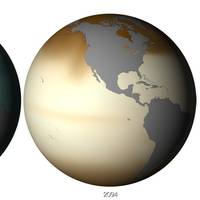
Scientists say that the world’s oceans are acidifying. This term is correct, but somewhat misleading. Until recently, the oceans have had (so far as can be determined) a pH level of about 8.4 for millennia. A pH of 7.0 is neutral. Thus, the oceans are alkaline, not acidific. But, since the beginning of the industrial age when emissions of carbon dioxide started to rise, the oceans’ pH level has dropped to 8.3 and the waters have become less alkaline. Some argue that that is not a big change in 200 years. But it is the largest change known to have occurred in 20 million years.
IMO Signs Global Maritime Energy Efficiency Partnerships Project
International Maritime Organization (IMO) the Global Environment Facility (GEF) and the United Nations Development Programme (UNDP) have signed an agreement to allocate US$2.0 million to a two-year global maritime energy efficiency partnership project, which aims to support increased uptake and implementation of energy-efficiency measures for shipping. The so-called GloMEEP project, formally designated “Transforming the Global Maritime Transport Industry towards a Low Carbon Future through Improved Energy Efficiency”, will focus in particular on building capacity to implement technical and operational measures in developing countries, where shipping is increasingly concentrated.


